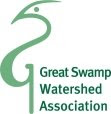by Laura Kelm, Director of Water Quality Programs
I’m sure we all remember the impacts that Hurricane Irene and Tropical Storm Lee had on our homes, businesses, and towns. Great Swamp Watershed Association was curious if the storms had any impacts on the two water pollution control utilities (a.k.a. WPCUs, or wastewater treatment plants) located in the watershed.The Woodland Water Pollution Control Utility of Morris Township discharges into Loantaka Brook. The plant did suffer a power outage as a result of the storms, but a backup generator was able to keep the plant running as usual. Timothy O’Dell, assistant superintendent of the WPCU, noted that the plant was designed to treat a maximum of 2.2 million gallons per day (mgd), while its average daily volume is only half that amount. This allows excess volume generated by storms to be held and treated afterward to meet state water quality requirements for WPCU effluent.
The Chatham Township WPCU, which discharges to Black Brook, also lost power during the storms, but was kept online with power from a backup generator. The maximum permitted flow at this smaller plant is 0.875 mgd. During the days after Hurricane Irene, the plant saw volumes as high as 2.26 mgd. Marc Christensen, the water pollution control manager, said that while the excess flow meant that the water moved through the plant faster than normal, the WPCU still met all of its target requirements for effluent.
Here are some other interesting facts and figures about these two WPCUs—
The Morris Township Woodland WPCU:
- had its new system built in 1992 to provide tertiary treatment.
- can retain 1.5 mgd for future treatment.
- has no combined sewer overflows (aka. CSOs).
The Chatham Township WPCU:
- has a normal flow under 0.875 mgd.
- took precautionary measures before Irene hit, including reducing the amount of solids held in inventory, in order to hold greater capacity during the storm.
- increases its flow during precipitation events because of open tanks at the WPCU, some infiltration from manhole covers and pipes, and some illegal hookups of rain gutters into sewer lines.
- has no combined sewer overflows (aka. CSOs).
- measured the following flows after Irene: 1.54 mgd on 8/27/20112.26 mgd on 8/28/20111.435 mgd on 8/29/20111.441 mgd on 8/30/2011, and1.167 mgd on 8/31/2011.
Reprinted from Great Swamp Watershed Association, Across The Watershed, Spring-Summer 2012.
---
Editor's note: The spate of turbulent weather in the Great Swamp region that originally sparked our interest in learning more about what happens at our local Water Pollution Control Utilities has stuck with us for many months. How much of what we have experience—hurricanes, tropical storms, rampant flooding, mild winters, and unusual snow falls—actually demonstrate the effects of global climate change on our small corner of the world?
We decided to go in search of some answers that we could share with you in the form of one of our regularly schedule, early morning Breakfast Briefings.
On Tuesday, April 10, from 8:00 a.m. to 9:30 a.m., Professor Anthony Broccoli, director of the Rutgers Center for Environmental Predication, will try to help us understand what to expect of the changing weather in our state in the coming months and years. He also will explain studying the causes of climate change might help us all prepare for what is coming.
Please join us at GSWA's headquaters located at 568 Tempe Wick Road in Morristown, NJ, for this very special presentation.
Register at www.GreatSwamp.org/EventReg.htm if you wish to attend, or give us a call at 973-538-3500 x22. Registration is free for current GSWA members. Non-members are asked to make a voluntary donation of $10/adult and $5/child (6-17 yrs.), or $30/family (includes 4 or more people).






